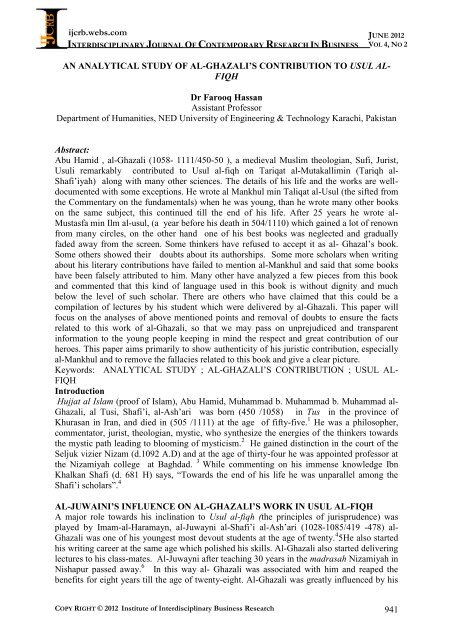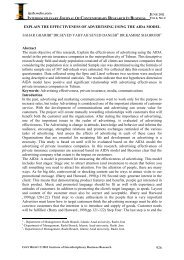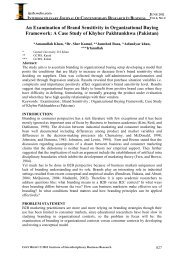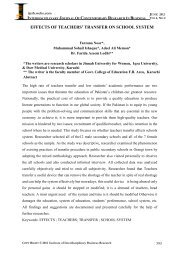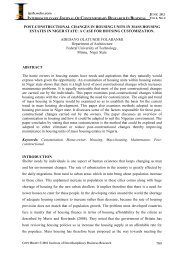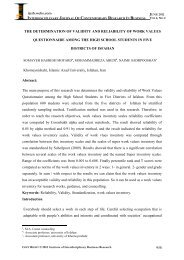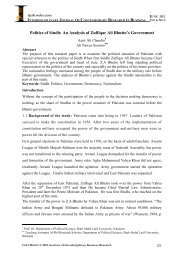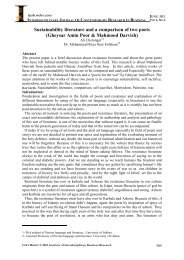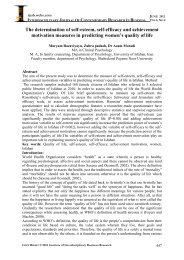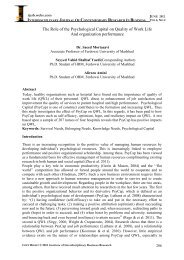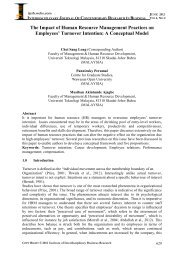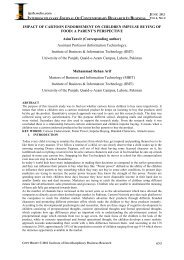an analytical study of al-ghazali's contribution to usul al-fiqh - journal ...
an analytical study of al-ghazali's contribution to usul al-fiqh - journal ...
an analytical study of al-ghazali's contribution to usul al-fiqh - journal ...
Create successful ePaper yourself
Turn your PDF publications into a flip-book with our unique Google optimized e-Paper software.
ijcrb.webs.com<br />
INTERDISCIPLINARY JOURNAL OF CONTEMPORARY RESEARCH IN BUSINESS<br />
COPY RIGHT © 2012 Institute <strong>of</strong> Interdisciplinary Business Research<br />
JUNE 2012<br />
VOL 4, NO 2<br />
AN ANALYTICAL STUDY OF AL-GHAZALI’S CONTRIBUTION TO USUL AL-<br />
FIQH<br />
Dr Farooq Hass<strong>an</strong><br />
Assist<strong>an</strong>t Pr<strong>of</strong>essor<br />
Department <strong>of</strong> Hum<strong>an</strong>ities, NED University <strong>of</strong> Engineering & Technology Karachi, Pakist<strong>an</strong><br />
Abstract:<br />
Abu Hamid , <strong>al</strong>-Ghaz<strong>al</strong>i (1058- 1111/450-50 ), a mediev<strong>al</strong> Muslim theologi<strong>an</strong>, Sufi, Jurist,<br />
Usuli remarkably contributed <strong>to</strong> Usul <strong>al</strong>-<strong>fiqh</strong> on Tariqat <strong>al</strong>-Mutak<strong>al</strong>limin (Tariqh <strong>al</strong>-<br />
Shafi’iyah) <strong>al</strong>ong with m<strong>an</strong>y other sciences. The details <strong>of</strong> his life <strong>an</strong>d the works are welldocumented<br />
with some exceptions. He wrote <strong>al</strong> M<strong>an</strong>khul min T<strong>al</strong>iqat <strong>al</strong>-Usul (the sifted from<br />
the Commentary on the fundament<strong>al</strong>s) when he was young, th<strong>an</strong> he wrote m<strong>an</strong>y other books<br />
on the same subject, this continued till the end <strong>of</strong> his life. After 25 years he wrote <strong>al</strong>-<br />
Mustasfa min Ilm <strong>al</strong>-<strong>usul</strong>, (a year before his death in 504/1110) which gained a lot <strong>of</strong> renown<br />
from m<strong>an</strong>y circles, on the other h<strong>an</strong>d one <strong>of</strong> his best books was neglected <strong>an</strong>d gradu<strong>al</strong>ly<br />
faded away from the screen. Some thinkers have refused <strong>to</strong> accept it as <strong>al</strong>- Ghaz<strong>al</strong>’s book.<br />
Some others showed their doubts about its authorships. Some more scholars when writing<br />
about his literary <strong>contribution</strong>s have failed <strong>to</strong> mention <strong>al</strong>-M<strong>an</strong>khul <strong>an</strong>d said that some books<br />
have been f<strong>al</strong>sely attributed <strong>to</strong> him. M<strong>an</strong>y other have <strong>an</strong><strong>al</strong>yzed a few pieces from this book<br />
<strong>an</strong>d commented that this kind <strong>of</strong> l<strong>an</strong>guage used in this book is without dignity <strong>an</strong>d much<br />
below the level <strong>of</strong> such scholar. There are others who have claimed that this could be a<br />
compilation <strong>of</strong> lectures by his student which were delivered by <strong>al</strong>-Ghaz<strong>al</strong>i. This paper will<br />
focus on the <strong>an</strong><strong>al</strong>yses <strong>of</strong> above mentioned points <strong>an</strong>d remov<strong>al</strong> <strong>of</strong> doubts <strong>to</strong> ensure the facts<br />
related <strong>to</strong> this work <strong>of</strong> <strong>al</strong>-Ghaz<strong>al</strong>i, so that we may pass on unprejudiced <strong>an</strong>d tr<strong>an</strong>sparent<br />
information <strong>to</strong> the young people keeping in mind the respect <strong>an</strong>d great <strong>contribution</strong> <strong>of</strong> our<br />
heroes. This paper aims primarily <strong>to</strong> show authenticity <strong>of</strong> his juristic <strong>contribution</strong>, especi<strong>al</strong>ly<br />
<strong>al</strong>-M<strong>an</strong>khul <strong>an</strong>d <strong>to</strong> remove the f<strong>al</strong>lacies related <strong>to</strong> this book <strong>an</strong>d give a clear picture.<br />
Keywords: ANALYTICAL STUDY ; AL-GHAZALI’S CONTRIBUTION ; USUL AL-<br />
FIQH<br />
Introduction<br />
Hujjat <strong>al</strong> Islam (pro<strong>of</strong> <strong>of</strong> Islam), Abu Hamid, Muhammad b. Muhammad b. Muhammad <strong>al</strong>-<br />
Ghaz<strong>al</strong>i, <strong>al</strong> Tusi, Shafi’i, <strong>al</strong>-Ash’ari was born (450 /1058) in Tus in the province <strong>of</strong><br />
Khuras<strong>an</strong> in Ir<strong>an</strong>, <strong>an</strong>d died in (505 /1111) at the age <strong>of</strong> fifty-five. 1 He was a philosopher,<br />
commenta<strong>to</strong>r, jurist, theologi<strong>an</strong>, mystic, who synthesize the energies <strong>of</strong> the thinkers <strong>to</strong>wards<br />
the mystic path leading <strong>to</strong> blooming <strong>of</strong> mysticism. 2 He gained distinction in the court <strong>of</strong> the<br />
Seljuk vizier Nizam (d.1092 A.D) <strong>an</strong>d at the age <strong>of</strong> thirty-four he was appointed pr<strong>of</strong>essor at<br />
the Nizamiyah college at Baghdad. 3 While commenting on his immense knowledge Ibn<br />
Kh<strong>al</strong>k<strong>an</strong> Shafi (d. 681 H) says, “Towards the end <strong>of</strong> his life he was unpar<strong>al</strong>lel among the<br />
Shafi’i scholars”. 4<br />
AL-JUWAINI’S INFLUENCE ON AL-GHAZALI’S WORK IN USUL AL-FIQH<br />
A major role <strong>to</strong>wards his inclination <strong>to</strong> Usul <strong>al</strong>-<strong>fiqh</strong> (the principles <strong>of</strong> jurisprudence) was<br />
played by Imam-<strong>al</strong>-Haramayn, <strong>al</strong>-Juwayni <strong>al</strong>-Shafi’i <strong>al</strong>-Ash’ari (1028-1085/419 -478) <strong>al</strong>-<br />
Ghaz<strong>al</strong>i was one <strong>of</strong> his youngest most devout students at the age <strong>of</strong> twenty. 4 5He <strong>al</strong>so started<br />
his writing career at the same age which polished his skills. Al-Ghaz<strong>al</strong>i <strong>al</strong>so started delivering<br />
lectures <strong>to</strong> his class-mates. Al-Juwayni after teaching 30 years in the madrasah Nizamiyah in<br />
Nishapur passed away. 6 In this way <strong>al</strong>- Ghaz<strong>al</strong>i was associated with him <strong>an</strong>d reaped the<br />
benefits for eight years till the age <strong>of</strong> twenty-eight. Al-Ghaz<strong>al</strong>i was greatly influenced by his<br />
941
ijcrb.webs.com<br />
INTERDISCIPLINARY JOURNAL OF CONTEMPORARY RESEARCH IN BUSINESS<br />
COPY RIGHT © 2012 Institute <strong>of</strong> Interdisciplinary Business Research<br />
JUNE 2012<br />
VOL 4, NO 2<br />
illustrious teacher <strong>an</strong>d the effects <strong>of</strong> this c<strong>an</strong> be seen very clearly in the early writings <strong>of</strong> <strong>al</strong>-<br />
Ghaz<strong>al</strong>i, his first book on Usul <strong>al</strong>-<strong>fiqh</strong>, <strong>al</strong>-M<strong>an</strong>khul’s style <strong>of</strong> writing is <strong>an</strong> evidence <strong>of</strong> his<br />
teacher’s influence; the same attitude <strong>an</strong>d way <strong>of</strong> thinking resulted in m<strong>an</strong>y controversies in<br />
his life <strong>an</strong>d after his death. Azeem Adeeb, after indepth <strong>study</strong> <strong>of</strong> the book, <strong>al</strong>-Burh<strong>an</strong> by <strong>al</strong>-<br />
Juwayni <strong>an</strong>d <strong>al</strong>-M<strong>an</strong>khul by <strong>al</strong>- Ghaz<strong>al</strong>i came <strong>to</strong> the conclusion that in re<strong>al</strong>ity <strong>al</strong>-M<strong>an</strong>khul is<br />
the summary <strong>of</strong> <strong>al</strong>-Burh<strong>an</strong>. 7<br />
THE CONTRIBUTIONS OF AL-GHAZALI TO USUL AL-FIQH<br />
Al-Juwayni, teacher <strong>of</strong> <strong>al</strong>-Ghaz<strong>al</strong>, <strong>an</strong> import<strong>an</strong>t thinker <strong>of</strong> the Ash’ari school, philosopher,<br />
theologi<strong>an</strong> <strong>an</strong>d jurist remarkably contributed <strong>to</strong> Islamic theology, Usul <strong>al</strong>- <strong>fiqh</strong> like <strong>al</strong>-<br />
Burh<strong>an</strong>, <strong>al</strong>-Waraqat, 8 T<strong>al</strong>khees, <strong>al</strong>- tuhfa 9 etc. <strong>al</strong>ong with m<strong>an</strong>y other sciences which gained<br />
a lot <strong>of</strong> renown from m<strong>an</strong>y circles 8 . Moreover, his student, <strong>al</strong>- Ghaz<strong>al</strong>i is seen writing on the<br />
same level <strong>of</strong> his teacher in the service <strong>of</strong> principles <strong>of</strong> Islamic Jurisprudence (Usul <strong>al</strong>- <strong>fiqh</strong>)<br />
<strong>an</strong>d proved not only a prolific writer but <strong>al</strong>so a highly accomplished one. Al-Ghaz<strong>al</strong>i, in the<br />
preface <strong>of</strong> <strong>al</strong>-Mustasfa mentioned that he wrote most <strong>of</strong> the books on Usul-<strong>al</strong> <strong>fiqh</strong> before<br />
stepping in<strong>to</strong> Tasawwauf (mysticism). 11<br />
The books <strong>of</strong> <strong>al</strong>-Ghaz<strong>al</strong>i on Usul <strong>al</strong>- <strong>fiqh</strong>: Taha Jabir Alw<strong>an</strong>i mentions the four books <strong>of</strong> <strong>al</strong>-<br />
Ghaz<strong>al</strong>i on Usul-<strong>al</strong>-<strong>fiqh</strong>, <strong>al</strong> M<strong>an</strong>khul, <strong>al</strong>-Mustasfa, Shifa <strong>al</strong> Gh<strong>al</strong>il <strong>an</strong>d Tahzeeb <strong>al</strong>-Usul 12 M.<br />
H. Hi<strong>to</strong> mentions the six books <strong>of</strong> <strong>al</strong>-Ghaz<strong>al</strong>i in Usul <strong>al</strong>-<strong>fiqh</strong> he addes two more books<br />
Tahseen <strong>al</strong>-Maa’khaz <strong>an</strong>d <strong>al</strong>- Mknun 13 Shibli Nom<strong>an</strong>i (1857-1914 A.D) states that <strong>al</strong>-<br />
Ghaz<strong>al</strong>i wrote the following seven books on Usul <strong>al</strong>-<strong>fiqh</strong>.<br />
1. <strong>al</strong>-M<strong>an</strong>khul min T<strong>al</strong>iqat <strong>al</strong>-Usul (the sifted from the Commentary on the fundament<strong>al</strong>s<br />
2. <strong>al</strong>-Mustasfa min 'ilm <strong>al</strong>-Usul (On Leg<strong>al</strong> theory <strong>of</strong> Muslim Jurisprudence)<br />
3. Shifa <strong>al</strong>- Gh<strong>al</strong>il fi bay<strong>an</strong> <strong>al</strong>-shubh wa <strong>al</strong>-Mukhil wa Ms<strong>al</strong>ik <strong>al</strong>-Ta’lil<br />
4. Tahseen <strong>al</strong> Maa’khaz<br />
5. Muntah<strong>al</strong> fi ilm <strong>al</strong> Jad<strong>al</strong><br />
6. Maakhz fi <strong>al</strong> Khilafiyat<br />
7. Mfass<strong>al</strong> <strong>al</strong> Khilaf fi Usul <strong>al</strong> Qiyas 14<br />
Shifa <strong>al</strong> Gh<strong>al</strong>eel fi by<strong>an</strong> <strong>al</strong> shibh wlmkhyl wa ms<strong>al</strong>ik <strong>al</strong> t<strong>al</strong>il has been edited by Hamd <strong>al</strong>-<br />
Kbisi <strong>an</strong>d published from Baghdad, <strong>al</strong> Irshad Press in 1971 A.D/ 1390 H. <strong>al</strong>-Ghaz<strong>al</strong>i in the<br />
preface (Muqaddima <strong>al</strong> Kitab) <strong>of</strong> <strong>al</strong>-Mustasfa has mentioned name <strong>of</strong> <strong>an</strong>other book Tahzib <strong>al</strong><br />
Usul. Ibn <strong>al</strong> Kh<strong>al</strong>k<strong>an</strong> (608-681 H) has mentioned <strong>an</strong>other book <strong>al</strong> Muntah<strong>al</strong> fi Ilm <strong>al</strong> Jad<strong>al</strong> by<br />
Ghaz<strong>al</strong>i. 15 Ibn <strong>al</strong>- Immad H<strong>an</strong>b<strong>al</strong>i (d. 1089), has <strong>al</strong>so mentioned '<strong>al</strong>-Mustasfa <strong>an</strong>d Tahsil <strong>al</strong>-<br />
Makhz fi <strong>al</strong> Khilaf” 16 but he did not mention <strong>al</strong>- M<strong>an</strong>khul. Al -Maraghi has included <strong>al</strong>-<br />
Mknoon fi <strong>al</strong> Usul by <strong>al</strong>- Ghaz<strong>al</strong> 17 Ismail Basha (d.1339 H) has not only mentioned <strong>al</strong>-<br />
Mustasfa fi Usul <strong>al</strong>- <strong>fiqh</strong> but <strong>al</strong>so Ghayat <strong>al</strong> Wsul fil Usul. 18 Haji Kh<strong>al</strong>ifa H<strong>an</strong>afi (1067 H)<br />
while discussing the intellectu<strong>al</strong> services <strong>of</strong> Abu M<strong>an</strong>soor Jam<strong>al</strong> <strong>al</strong>- Din Hass<strong>an</strong> b. <strong>al</strong>-<br />
Motahhair <strong>al</strong>- Shai’i (d. 726 H) has stated that the Sharah (commentary) on Ghayat <strong>al</strong> Wsul<br />
fil Usul was written by him <strong>an</strong>d he was able <strong>to</strong> complete the work in 681 H. 19 Mazhar Baqa<br />
has <strong>al</strong>so included Sharah Ghayat <strong>al</strong> Wsul fil Usul in the works. 20 It is evident from the above<br />
mentioned statements that Ghayat <strong>al</strong> Wsul fil Usul was a book <strong>of</strong> <strong>al</strong>-Ghaz<strong>al</strong>i, Abu M<strong>an</strong>soor<br />
<strong>al</strong>- Motahhair <strong>al</strong>- Shai’i (d. 726 H) wrote a sharh (commentary) on it. Ismail Basha has <strong>al</strong>so<br />
mentioned one more book <strong>al</strong> -T<strong>al</strong>iq <strong>al</strong> Usul written by <strong>al</strong>-Ghaz<strong>al</strong>i 21 .Al-Ta’liqa (a commentary<br />
942
ijcrb.webs.com<br />
INTERDISCIPLINARY JOURNAL OF CONTEMPORARY RESEARCH IN BUSINESS<br />
COPY RIGHT © 2012 Institute <strong>of</strong> Interdisciplinary Business Research<br />
JUNE 2012<br />
VOL 4, NO 2<br />
on <strong>al</strong>-Juw<strong>an</strong>i’s Usul <strong>al</strong>-<strong>fiqh</strong> work) is <strong>al</strong>so mentioned <strong>an</strong>d appreciated in the works <strong>of</strong> <strong>al</strong>-<br />
Ghaz<strong>al</strong>i. 22<br />
Place <strong>of</strong> <strong>al</strong>-Mustasfa in the books on Usul <strong>al</strong>-<strong>fiqh</strong>: Abd <strong>al</strong>-Rahm<strong>an</strong> b. Muhammad b.<br />
Muhammad, Ibn Kh<strong>al</strong>dun, M<strong>al</strong>ki (d.808 /1406) writes, <strong>al</strong>-Mustasfa by <strong>al</strong>-Ghaz<strong>al</strong>i Shafi’i is<br />
one <strong>of</strong> four works that <strong>al</strong>l Usul <strong>al</strong>-<strong>fiqh</strong> works revolve around them, <strong>al</strong>-Burh<strong>an</strong> by <strong>al</strong>-Juwayni<br />
Shafi’i (d. 478 H), <strong>al</strong>-Am’d by `Abd <strong>al</strong>-Jabbar, Mu`taz<strong>al</strong>ite (d. 415), <strong>al</strong>-mu`tamad<br />
(commentary on <strong>al</strong>-`umad) by Abu <strong>al</strong>-Hussain <strong>al</strong>-Basri (d.473 H). 23<br />
<strong>al</strong>-Mustasfa min 'ilm <strong>al</strong>-Usul : It has been published from Cairo, Mustufa Muhammad<br />
Press in 1937 A.D <strong>an</strong>d <strong>al</strong>so in two volumes from Cairo, <strong>al</strong>-Amiriya Press in 1322/1905 <strong>an</strong>d<br />
1324/1907 with fwatih <strong>al</strong> Rahmut. Again it has been published from Baghdad, Maktaba <strong>al</strong>-<br />
Mus<strong>an</strong>na in 1970 A.D. Its Bulaq edition in two volumes reprinted in Beirut. Recently edited<br />
by Hamza bin Zubair, Hafiz, in four volumes (in 2156 pages) published from Jeddah, Dar <strong>al</strong>-<br />
Nashr. Hammad, Ahmad Zaki did his Ph.D on Abu Hamid <strong>al</strong>-Ghaz<strong>al</strong>i’s Juristic doctrine in<br />
<strong>al</strong>-Mustasfa min ‘ilm <strong>al</strong> <strong>usul</strong>’ from the University <strong>of</strong> Chicago, in 1987, Vol. 1 was tr<strong>an</strong>slated<br />
in<strong>to</strong> two parts in English. 24<br />
Shoruh /T<strong>al</strong>iqat/Ikhtisarat <strong>of</strong> <strong>al</strong>-Mustasfa: Some <strong>of</strong> scholars who wrote sharh<br />
(commentary) on <strong>al</strong>-Mustasfa are:<br />
1. Ibn <strong>al</strong>-Nazir, Hussain b. Abd <strong>al</strong>-Aziz Muhammad, M<strong>al</strong>ki (603-679 H) 25<br />
2. Abu Ja’afer, Ahmed b. Muhammad b. Ahmed Abd <strong>al</strong>-Rehm<strong>an</strong> bin Mus’ada <strong>al</strong>-<br />
Gharnati (d. 699 H.) <strong>al</strong>so wrote Sharh on it. Ibn Farhun <strong>al</strong>-M<strong>al</strong>ki (d.799 H) said it is<br />
“<strong>an</strong> excellent sharh (Commentary)” 26<br />
3. Ibn <strong>al</strong>-Ahwas, Hafiz Abu Ali <strong>al</strong>-Hass<strong>an</strong> (Hussain) b. Abd <strong>al</strong>-Aziz b. Muhammad <strong>al</strong>-<br />
Gharnati, <strong>al</strong>-Andulsi M<strong>al</strong>iki (603-699H). 27<br />
4. Ta’<strong>al</strong>iqa: Abu <strong>al</strong>-Hass<strong>an</strong> Sh<strong>al</strong> b. Muhammad b. Suhail bin M<strong>al</strong>ik <strong>al</strong>-Arzi <strong>al</strong>-Gharnati<br />
(559-639 H) wrote Ta’<strong>al</strong>iq on <strong>al</strong>-Mustasfa. 28<br />
5. Some Ikhtisarat (brief commentaries): Ali b. Abu <strong>al</strong>-Qasim b. abi Q<strong>an</strong>un (d. 575<br />
H) 29<br />
6. Muhammad b. Abd <strong>al</strong>-Haq <strong>al</strong>-Ya’emar <strong>al</strong>-Nazromi (d.625 H) wrote Mustasfa <strong>al</strong>-<br />
Mustasfa. 30<br />
7. Ibn <strong>al</strong>-Haaj, Abu <strong>al</strong>-Abbas Ahmed b. Muhammad b. Ahmed <strong>al</strong>-Arzi, <strong>al</strong>-Ashbili, <strong>al</strong>-<br />
Andulsi (651-647 H) wrote Mukhtasr <strong>al</strong> –Mustasfa <strong>an</strong>d <strong>al</strong>so Hashiya <strong>al</strong>a Mushkilat<br />
<strong>al</strong>-Mustasfa (footnote on difficult points) 31<br />
8. Abu <strong>al</strong>-W<strong>al</strong>id, Muhammad bin Rushd<strong>al</strong>-Hafid, <strong>al</strong>-M<strong>al</strong>iki (520-595 H) wrote <strong>al</strong>-Darori<br />
fi Usul <strong>al</strong>-<strong>fiqh</strong> (Mukhtasr <strong>al</strong>-Mustasfa), which has been edited by Jam<strong>al</strong> <strong>al</strong>-Din Alwi,<br />
Muhammad All<strong>al</strong> Sinadr <strong>an</strong>d published from Beirut, Dar <strong>al</strong>-Gharb <strong>al</strong>-Islami in 1994<br />
Place <strong>of</strong> <strong>al</strong>-M<strong>an</strong>khul in the books <strong>of</strong> Usul <strong>al</strong>-<strong>fiqh</strong>: <strong>al</strong>-M<strong>an</strong>khul min 'ilm <strong>al</strong>-Usul has been<br />
edited by M.H. Hi<strong>to</strong>, <strong>an</strong>d published from Damascus, Dar <strong>al</strong> Fikr ed. 2nd 1400 H. Some <strong>of</strong> the<br />
<strong>al</strong>-Ghaz<strong>al</strong>i’s books such as <strong>al</strong>-M<strong>an</strong>khul have not given due regard <strong>an</strong>d status which they<br />
deserve. M<strong>an</strong>y scholars have written in detail on his life <strong>an</strong>d academic services <strong>an</strong>d<br />
mentioned some <strong>of</strong> his book on Usul <strong>al</strong>-<strong>fiqh</strong> but have not mentioned <strong>al</strong>-M<strong>an</strong>khul even in<br />
passing. The following sources prove that the book <strong>al</strong>-M<strong>an</strong>khul was just studied<br />
943
ijcrb.webs.com<br />
INTERDISCIPLINARY JOURNAL OF CONTEMPORARY RESEARCH IN BUSINESS<br />
COPY RIGHT © 2012 Institute <strong>of</strong> Interdisciplinary Business Research<br />
JUNE 2012<br />
VOL 4, NO 2<br />
superfici<strong>al</strong>ly, Encyclopaedia Brit<strong>an</strong>ica 32 The Encyclopaedia Americ<strong>an</strong>a 33 The New Columbia<br />
Encyclopaedia 34 Encyclopedia <strong>of</strong> Islamic Civilisation <strong>an</strong>d Religion 35 Shorter Encyclopaedia<br />
<strong>of</strong> Islam 36 The Encyclopaedia <strong>of</strong> Islam 37 Chambers's Encyclopaedia 38 The Oxford<br />
Encyclopedia <strong>of</strong> the Modern Islamic World. 39 In addition <strong>to</strong> the above mentioned sources,<br />
Umar Raza Kuh<strong>al</strong>a after giving a list <strong>of</strong> books by Orient<strong>al</strong>ist which de<strong>al</strong> with the life <strong>an</strong>d<br />
academic <strong>contribution</strong>s <strong>of</strong> <strong>al</strong>- Ghaz<strong>al</strong>i 40 <strong>al</strong>so affirm that the book <strong>al</strong>-M<strong>an</strong>khul was just<br />
skimmed through.<br />
We v<strong>al</strong>ue the work <strong>of</strong> non-Muslim scholars who have contributed <strong>an</strong>d commented on the life<br />
<strong>an</strong>d works <strong>of</strong> <strong>al</strong>- Ghaz<strong>al</strong>i without <strong>an</strong>y prejudices <strong>an</strong>d without taking <strong>an</strong>y sides. But at the<br />
same time we feel it is necessary <strong>to</strong> point out their flaws <strong>an</strong>d <strong>to</strong> their wrong claims. Putting<br />
doubts in the minds <strong>of</strong> the readers regarding Islam <strong>an</strong>d some books <strong>of</strong> Muslim scholars.<br />
Some Orent<strong>al</strong>ists created doubts in the minds <strong>of</strong> readers regarding <strong>al</strong>-M<strong>an</strong>khul in such a<br />
subtle but effective m<strong>an</strong>ner. Therefore, it is necessary that the young generation be guided on<br />
the right ways in this regard <strong>an</strong>d their doubts <strong>an</strong>d suspicions be removed. W. M. Watt in the<br />
Ensyclopedia Americ<strong>an</strong>a while discussing the life <strong>an</strong>d works <strong>of</strong> <strong>al</strong>- Ghaz<strong>al</strong>i says, "Most <strong>of</strong> his<br />
books <strong>an</strong>d pamphlets have survived <strong>an</strong>d works have <strong>al</strong>so been f<strong>al</strong>sely ascribed <strong>to</strong> him" 41<br />
Montgomery has not pointed out the books <strong>of</strong> <strong>al</strong>-Ghaz<strong>al</strong>i which are f<strong>al</strong>sely attributed <strong>to</strong> him.<br />
The reader is left with the question un<strong>an</strong>swered about the doubtful books.<br />
W.M. Watt has <strong>al</strong>so discussed the life <strong>of</strong> works <strong>of</strong> <strong>al</strong>-Ghaz<strong>al</strong>i in Encyclopaedia Brit<strong>an</strong>nica.<br />
He says, “Over 400 works are ascribed <strong>to</strong> <strong>al</strong>-Ghaz<strong>al</strong>i, but the probably did not write nearly so<br />
m<strong>an</strong>y. Frequently the same work <strong>to</strong> found with different title in different m<strong>an</strong>uscripts, but<br />
m<strong>an</strong>y <strong>of</strong> the numerous m<strong>an</strong>uscripts have not yet been carefully examined. Sever<strong>al</strong> works have<br />
<strong>al</strong>so been f<strong>al</strong>sely ascribed <strong>to</strong> him <strong>an</strong>d others are <strong>of</strong> doubtful authenticity. At least 50 genuine<br />
works ext<strong>an</strong>t, some relatively short." 42 The following points become evident from the above<br />
statement by Montgomery on intellectu<strong>al</strong> achievements <strong>of</strong> <strong>al</strong>-Ghaz<strong>al</strong>i,<br />
1. Al- Ghaz<strong>al</strong>i did not write 400 books<br />
2. At least 50 short <strong>an</strong>d long book definitely his writings.<br />
3. The same book has m<strong>an</strong>y names.<br />
4. The books have not been carefully, deeply <strong>an</strong>d thoroughly studied <strong>an</strong>d <strong>an</strong><strong>al</strong>yzed.<br />
5. Doubts have been expressed regarding the authenticity <strong>of</strong> the written materi<strong>al</strong>.<br />
The above mentioned comments have made least 350 <strong>of</strong> <strong>al</strong>- Ghaz<strong>al</strong>i’s book under suspicion<br />
<strong>an</strong>d doubt. M. H. Hai<strong>to</strong> has mentioned <strong>an</strong>d discussed 500 <strong>of</strong> <strong>al</strong>-Ghaz<strong>al</strong>i’s books but has not<br />
expressed doubts about <strong>an</strong>yone. Shibli highlighted that only 4 books <strong>of</strong> <strong>al</strong>-Ghaz<strong>al</strong>i, regarding<br />
his authorship c<strong>an</strong> be categorized as doubtful.<br />
Root <strong>an</strong>d me<strong>an</strong>ings <strong>of</strong> <strong>al</strong>-M<strong>an</strong>khuk : The root word <strong>of</strong> M<strong>an</strong>khul is Nakhl. Nakhl has m<strong>an</strong>y<br />
me<strong>an</strong>ings such as flour after it has been sieved (me<strong>an</strong>s pure flour). If it is from bab nasara<br />
y<strong>an</strong>suru it me<strong>an</strong>s <strong>to</strong> sieve or purify flour. According <strong>to</strong> this me<strong>an</strong>ing, the name <strong>of</strong> the book<br />
implies that the problems <strong>of</strong> the principles <strong>of</strong> Islamic Jurisprudence after passing through<br />
rigorous st<strong>an</strong>dards have been stated. The me<strong>an</strong>ing <strong>of</strong> nakhl <strong>al</strong>- shai me<strong>an</strong>s <strong>to</strong> chose <strong>an</strong>d purify<br />
something, its subject is <strong>al</strong>- Naakhil. And naseeha <strong>al</strong>-nakhilah me<strong>an</strong>s <strong>to</strong> give advice<br />
sincerely, without <strong>an</strong>y selfish motives. Therefore, this book guides <strong>an</strong>d advises <strong>to</strong> the readers<br />
on the Usul <strong>al</strong>-<strong>fiqh</strong> <strong>an</strong>d issues related <strong>to</strong> it. A date-p<strong>al</strong>m tree is <strong>al</strong>so c<strong>al</strong>led <strong>al</strong>-nakhl <strong>an</strong>d its<br />
plur<strong>al</strong> is nakhlah. Date p<strong>al</strong>m tree grows in hot places like deserts <strong>an</strong>d its trunk is t<strong>al</strong>l <strong>an</strong>d<br />
straight. The dates that this tree produces if full <strong>of</strong> benefits. 43<br />
944
ijcrb.webs.com<br />
INTERDISCIPLINARY JOURNAL OF CONTEMPORARY RESEARCH IN BUSINESS<br />
COPY RIGHT © 2012 Institute <strong>of</strong> Interdisciplinary Business Research<br />
JUNE 2012<br />
VOL 4, NO 2<br />
A person’s hunger c<strong>an</strong> be satisfied with dates <strong>an</strong>d feel nourished <strong>an</strong>d strengthened. This way<br />
this book will satisfy the people who are hungry for knowledge <strong>of</strong> Usul <strong>al</strong>-<strong>fiqh</strong> <strong>an</strong>d give them<br />
a feeling <strong>of</strong> complete satisfaction <strong>an</strong>d happiness. In a Hadith a Muslim is compared with a<br />
date-tree, because this tree c<strong>an</strong> provide a lot <strong>of</strong> benefits <strong>an</strong>d it is one <strong>of</strong> its own kinds. 44<br />
THE ARGUMENTS TO PROVE THE AUTHORSHIP OF AL-MANKHUL TO AL-<br />
GHAZALI<br />
And from the time <strong>of</strong> <strong>al</strong>-Ghaz<strong>al</strong>i till <strong>to</strong>day a great number <strong>of</strong> Jurists <strong>an</strong>d his<strong>to</strong>ri<strong>an</strong>s have<br />
claimed that this book was written by <strong>al</strong>- Ghaz<strong>al</strong>i.<br />
1. Shibli justifies the authorship <strong>of</strong> <strong>al</strong>- Ghaz<strong>al</strong>i <strong>to</strong> <strong>al</strong>-M<strong>an</strong>khul by various opinions <strong>of</strong><br />
scholars <strong>an</strong>d then expresses his opinion as followers, “Among the famous books <strong>of</strong><br />
Imam Ghaz<strong>al</strong>i, scholars express their doubts about certain books claimed <strong>to</strong> be written<br />
by him. Four <strong>of</strong> his books are mentioned in this regard, M<strong>an</strong>khul,Mznun bhi <strong>al</strong>a ghair<br />
ahlhi, kitab <strong>al</strong>- Nafkh wa <strong>al</strong>-Tswyah, sir <strong>al</strong>-Almin”. 45<br />
2. Shams <strong>al</strong>- Aymmah, Muhammad b. Abd <strong>al</strong>-Sattar <strong>al</strong>- Kurdari, <strong>al</strong>-H<strong>an</strong>afi (599-642 H)<br />
<strong>al</strong>so wrote a book <strong>to</strong> contradict <strong>al</strong>- M<strong>an</strong>hkul. 46 M. Abd <strong>al</strong>-Hai Lakhnawi (1264-1304<br />
H) confirms about the book <strong>an</strong>d writes that, “I have seen the book written <strong>to</strong><br />
contradict <strong>al</strong>-M<strong>an</strong>khul by <strong>al</strong>- Kurdari,……………” 47<br />
3. Al- Ghaz<strong>al</strong>i has indicated about <strong>al</strong>-M<strong>an</strong>khul in preface (muqaddimah <strong>al</strong> Kitab) <strong>of</strong> <strong>al</strong>-<br />
Mustasfa min Ilm <strong>al</strong>-Usul <strong>an</strong>d said it is a concise book. M. A. Gil<strong>an</strong>i draws the<br />
conclusion from the same passage in <strong>al</strong>-Mustasfa that, “<strong>al</strong>-M<strong>an</strong>khul was written by <strong>al</strong>-<br />
Ghaz<strong>al</strong>i” 48 He further says, “(the statement by <strong>al</strong>-Ghaz<strong>al</strong>i) removed the doubts from<br />
the minds <strong>of</strong> scholars who suspected about the authorship <strong>of</strong> <strong>al</strong>-M<strong>an</strong>khul <strong>to</strong> <strong>al</strong>-<br />
Ghaz<strong>al</strong>i. 49 <strong>al</strong>-M<strong>an</strong>khul is <strong>al</strong>so mentioned in <strong>an</strong>other book Shifaul Gh<strong>al</strong>i by <strong>al</strong>-Ghaz<strong>al</strong>i.<br />
4. Taj <strong>al</strong>-Din, Ibn <strong>al</strong> –Subki’s (727-771 H) comments in Tabaqat <strong>al</strong>-Shafi’iyyah<br />
confirms the authorship <strong>of</strong> <strong>al</strong>-M<strong>an</strong>khul <strong>to</strong> <strong>al</strong>-Ghaz<strong>al</strong>i with strength <strong>of</strong> conviction. He<br />
has <strong>al</strong>so mentioned the period <strong>of</strong> writing <strong>of</strong> <strong>al</strong>-M<strong>an</strong>khul <strong>an</strong>d says “ <strong>al</strong>-Ghaz<strong>al</strong>i wrote<br />
<strong>al</strong>-M<strong>an</strong>khul in the life <strong>of</strong> his teacher, Imam <strong>al</strong>-Haramain”. 50 One <strong>of</strong> the early attempts<br />
on leg<strong>al</strong> theory <strong>of</strong> Muslim Jurisprudence. Followed his teacher (<strong>al</strong>-Juwayni) who was<br />
reportedly impressed with this work. 51 Al-Juwayni died in 478 H at that time <strong>al</strong>-<br />
Ghaz<strong>al</strong>i was 28 years old. We c<strong>an</strong> guess that this book was written in the early life <strong>of</strong><br />
<strong>al</strong>-Ghaz<strong>al</strong>i <strong>an</strong>d is a product <strong>of</strong> his studious life <strong>an</strong>d teachings at madrassa Nizamiyah.<br />
5. Al-Maraghi mentioned only <strong>al</strong>-M<strong>an</strong>khul <strong>an</strong>d Al-Mustasfa, <strong>an</strong>d indicated about other<br />
books. 52 Al-Maraghi illustrated <strong>al</strong>-M<strong>an</strong>khul again in detail description <strong>of</strong> <strong>al</strong>-Ghaz<strong>al</strong>i. 53<br />
Perhaps Al-Maraghi w<strong>an</strong>ted <strong>to</strong> remove misconception about the authorship <strong>of</strong> <strong>al</strong>-<br />
M<strong>an</strong>khul <strong>to</strong> <strong>al</strong>-Ghaz<strong>al</strong>i, that is why he only mentioned first (<strong>al</strong>-M<strong>an</strong>khul) <strong>an</strong>d last (<strong>al</strong>-<br />
Mustasfa) books <strong>of</strong> <strong>al</strong>-Ghaz<strong>al</strong>i on Usul <strong>al</strong>-<strong>fiqh</strong> .<br />
945
ijcrb.webs.com<br />
INTERDISCIPLINARY JOURNAL OF CONTEMPORARY RESEARCH IN BUSINESS<br />
COPY RIGHT © 2012 Institute <strong>of</strong> Interdisciplinary Business Research<br />
JUNE 2012<br />
VOL 4, NO 2<br />
6. Shibli has quoting from Kashful Zonon by Haji Kh<strong>al</strong>ifa says that he has discussed <strong>al</strong> -<br />
M<strong>an</strong>khul by <strong>an</strong>other name rd abi H<strong>an</strong>ifa 54 It is possible that Haji Kh<strong>al</strong>ifa remembered<br />
<strong>al</strong>- M<strong>an</strong>khul by this name as in certain parts <strong>of</strong> the book, <strong>al</strong>-Ghaz<strong>al</strong>i has criticized<br />
Imam Abu H<strong>an</strong>ifa <strong>an</strong>d has disagreed with him on various issues. The same<br />
justification for the book is <strong>al</strong>so found in other sources. Sheikh M. Zahid Kawsari<br />
(1296-1371 H) has cited quotations in which <strong>al</strong>- Ghaz<strong>al</strong>i has spoken unfavorably<br />
about Imam Abu H<strong>an</strong>ifa <strong>an</strong>d has refuted Imam Abu H<strong>an</strong>ifa’s views strongly. He <strong>al</strong>so<br />
hinted that <strong>al</strong>-Ghaz<strong>al</strong>i gave up unfavorable opinions against Imam Abu H<strong>an</strong>ifa. 55<br />
7. Shibli states about <strong>al</strong>-M<strong>an</strong>khul. “Whereas <strong>al</strong>- Ghaz<strong>al</strong>i wrote books on different<br />
subjects but especi<strong>al</strong>ly he contributed in the fields <strong>of</strong> <strong>fiqh</strong> (jurisprudence), Usul <strong>al</strong><strong>fiqh</strong><br />
(Principles <strong>of</strong> Islamic Jurisprudence), Theology <strong>an</strong>d Ethics……. Al- Ghaz<strong>al</strong>i<br />
came up with a lot <strong>of</strong> new issues on Usul <strong>al</strong>-<strong>fiqh</strong>. Therefore, his book <strong>al</strong>-M<strong>an</strong>khul is a<br />
pro<strong>of</strong> <strong>of</strong> his forte”. 56 Shibli further writes “ <strong>al</strong>-M<strong>an</strong>khul which is a book on Usul <strong>al</strong><strong>fiqh</strong><br />
is the first book <strong>of</strong> <strong>al</strong>-Ghaz<strong>al</strong>i. I have read it. It’s a book <strong>of</strong> high st<strong>an</strong>dards as it<br />
was written by Ghaz<strong>al</strong>i in his youth. Al- Ghaz<strong>al</strong>i does not bind himself on passing<br />
verdict <strong>of</strong> <strong>an</strong>y other Imam or Jurist. He gives his verdicts openly <strong>an</strong>d freely with great<br />
confidence. This according <strong>to</strong> m<strong>an</strong>y scholars is a flaw <strong>an</strong>d, therefore, this book lost its<br />
place in their eyes”. 57<br />
THE ARGUMENTS ON DENIAL OF AL- GHAZALI’S AUTHORSHIP TO AL-<br />
MANKHUL<br />
Shibli quotes from the author <strong>of</strong> Qlaiad <strong>al</strong>- Uqy<strong>an</strong> from the source <strong>of</strong> Kashf <strong>al</strong>- Zunun<br />
that, “That (<strong>al</strong>- M<strong>an</strong>khul) was not written by <strong>al</strong>-Ghaz<strong>al</strong>i but by Mahmud Mautazili. 58<br />
M.A Gil<strong>an</strong>i writes that some scholars suspected the authorship <strong>of</strong> <strong>al</strong>-Ghaz<strong>al</strong>i <strong>to</strong> <strong>al</strong>-<br />
M<strong>an</strong>khul <strong>an</strong>d Haji Kh<strong>al</strong>ifa probably <strong>of</strong> the same views. 59<br />
Imam Ahmed b. Hajr <strong>al</strong>-Haithami <strong>al</strong>-Makki (d.973 H) in his book, <strong>al</strong>-Khairat <strong>al</strong>-<br />
Ahs<strong>an</strong> fi m<strong>an</strong>aqib <strong>al</strong>-Nom<strong>an</strong> has written that <strong>al</strong>-M<strong>an</strong>khul is not <strong>al</strong>- Ghz<strong>al</strong>i’s book.<br />
Infact, it was written by <strong>an</strong>other person by the name <strong>of</strong> Mahmud <strong>al</strong>-Ghaz<strong>al</strong>i<br />
Mautazili. 60<br />
Joshi has mentioned this book with reference <strong>to</strong> Ibn-e-Kh<strong>al</strong>k<strong>an</strong> <strong>an</strong>d writes,<br />
“Undoubtedly I could not find authentic pro<strong>of</strong>s <strong>to</strong> support the authorship by <strong>al</strong>-<br />
Ghaz<strong>al</strong>i <strong>of</strong> this book except that a H<strong>an</strong>afi Scholar had written a book <strong>to</strong> contradict<br />
it.” 61<br />
Carl Brockelm<strong>an</strong>n (1868 -1956 A.D), a Germ<strong>an</strong> Orinti<strong>al</strong>ist, expresses his opinion that<br />
it could have been written by one <strong>of</strong> Ghaz<strong>al</strong>i’s disciples. He says, “Perhaps, It is a<br />
book based on the lectures <strong>of</strong> <strong>al</strong>-Ghaz<strong>al</strong>i by one <strong>of</strong> his disciples who attended his<br />
classes religiously <strong>an</strong>d noted down <strong>al</strong>l the lectures.” 62<br />
While giving one <strong>of</strong> the reasons which created doubts about <strong>al</strong>-M<strong>an</strong>khul M.A.Gil<strong>an</strong>i<br />
writes, “Scholars were surprised on the l<strong>an</strong>guage used by <strong>al</strong>-Ghaz<strong>al</strong>i in <strong>al</strong>-M<strong>an</strong>khul about<br />
946
ijcrb.webs.com<br />
INTERDISCIPLINARY JOURNAL OF CONTEMPORARY RESEARCH IN BUSINESS<br />
COPY RIGHT © 2012 Institute <strong>of</strong> Interdisciplinary Business Research<br />
JUNE 2012<br />
VOL 4, NO 2<br />
Imams, because <strong>of</strong> the style <strong>of</strong> l<strong>an</strong>guage in the book, some scholars did not accept<br />
Ghaz<strong>al</strong>i’s authorship <strong>to</strong> it” 63 M.H. Hitu in the introduction <strong>of</strong> <strong>al</strong>-M<strong>an</strong>khul describes the<br />
reasons that why some scholars raised doubts regarding this book. In short those reasons<br />
are:<br />
1. Quoting Imam M<strong>al</strong>ik’s opinions without context:<br />
a. Al-Ghaz<strong>al</strong>i quoting Imam M<strong>al</strong>ik (d.179/795) in <strong>al</strong>-M<strong>an</strong>khul says concerning<br />
maslaha (considerations <strong>of</strong> public interest) he (Imam M<strong>al</strong>ik) goes <strong>to</strong> the extent<br />
for the istislah (juristic preference) <strong>of</strong> 2/3 rd <strong>of</strong> the Ummah, 1/3 rd <strong>of</strong> the Ummah<br />
c<strong>an</strong> be killed. In a similar way <strong>al</strong>-Ghaz<strong>al</strong>i quotes Imam M<strong>al</strong>ik capit<strong>al</strong> punishment<br />
is <strong>al</strong>lowed in Tazeer, (punishment, not mentioned in the Qur<strong>an</strong>). And out <strong>of</strong><br />
necessity <strong>an</strong>d expediency the rich people <strong>of</strong> the society c<strong>an</strong> be forced <strong>to</strong><br />
contribute money <strong>to</strong> the poor people. The sources <strong>to</strong> these quotes <strong>of</strong> Imam M<strong>al</strong>ik<br />
have not been mentioned by <strong>al</strong>-Ghaz<strong>al</strong>i <strong>an</strong>d according <strong>to</strong> some books by M<strong>al</strong>iki<br />
School <strong>of</strong> thoughts, these verdicts have been contradicted.<br />
b. In the same way, <strong>al</strong>- Ghaz<strong>al</strong>i quotes Imam M<strong>al</strong>ik in his book, <strong>al</strong>-M<strong>an</strong>khul that he<br />
by logic or reason is not convinced <strong>of</strong> the abrogation <strong>of</strong> the Qura’nic<br />
comm<strong>an</strong>dments by Hadith; <strong>al</strong>though this st<strong>an</strong>d <strong>of</strong> Imam M<strong>al</strong>ik c<strong>an</strong>not be proved<br />
with certainty. Imam M<strong>al</strong>ik accepts abrogation <strong>of</strong> Qur’<strong>an</strong>ic Comm<strong>an</strong>dments by<br />
Sunnah is lawful but it has never been applied. It is may be for these reasons that<br />
<strong>al</strong>- Ghaz<strong>al</strong>i in <strong>al</strong>- M<strong>an</strong>khul has not mentioned these statements again in <strong>al</strong>-<br />
Mustasfa.<br />
2. Quoting Imam Abu H<strong>an</strong>ifa’s opinions without context <strong>an</strong>d in a harsh m<strong>an</strong>ner:<br />
a. Al-Ghaz<strong>al</strong>i quotes Imam Abu H<strong>an</strong>ifa in <strong>al</strong>-M<strong>an</strong>khul <strong>an</strong>d says, “undoubtedly<br />
injunctions carried out repetitively are benefici<strong>al</strong>” But the writings <strong>of</strong> Imam Abu<br />
H<strong>an</strong>ifa prove the contrary. Imam Sarkhasi H<strong>an</strong>afi (d.483/1090) said, “The right<br />
thing is that the repetitiveness <strong>of</strong> injunctions is neither compulsory nor probable”.<br />
b. After a few lines, he says again, “Imam Shafi’i has said, injunctions may not be<br />
necessarily repeated but probable some other scholars claim that injunctions have<br />
been repeated until proven otherwise”. Al- Ghaz<strong>al</strong>i, quotes <strong>an</strong>d relates it <strong>to</strong> the<br />
H<strong>an</strong>afi school <strong>of</strong> thought <strong>an</strong>d then refutes it. However it should be noted that this<br />
view does not match with the H<strong>an</strong>afi school <strong>of</strong> thought <strong>an</strong>d Ibn Hammam <strong>to</strong>o<br />
agree with the H<strong>an</strong>afi school <strong>of</strong> thought. Ibn Hammam Says, “This structure <strong>an</strong>d<br />
tense (<strong>of</strong> amr) is used for absolute dem<strong>an</strong>d. There are no benefits attached <strong>to</strong><br />
repetition <strong>of</strong> injunctions <strong>an</strong>d not probable <strong>to</strong> it <strong>an</strong>d this is the best- liked injunction<br />
<strong>of</strong> H<strong>an</strong>afis. And the same thoughts <strong>an</strong>d feelings are found in the H<strong>an</strong>afi wittings.<br />
c. Al- Ghaz<strong>al</strong>i in <strong>al</strong>-M<strong>an</strong>khul in a chapter <strong>of</strong> the book gives priority <strong>of</strong> Shafi’i school<br />
<strong>of</strong> thought on others <strong>an</strong>d explained the reasons for doing so. Therefore he refuted<br />
947
ijcrb.webs.com<br />
INTERDISCIPLINARY JOURNAL OF CONTEMPORARY RESEARCH IN BUSINESS<br />
COPY RIGHT © 2012 Institute <strong>of</strong> Interdisciplinary Business Research<br />
JUNE 2012<br />
VOL 4, NO 2<br />
the views <strong>of</strong> H<strong>an</strong>afi school <strong>of</strong> thought. The details are gives in <strong>al</strong>-M<strong>an</strong>khul on<br />
page 499.<strong>al</strong>- Ghaz<strong>al</strong>i says, Imam Abu H<strong>an</strong>ifa has no comm<strong>an</strong>d over the Arabic<br />
l<strong>an</strong>guage <strong>an</strong>d c<strong>al</strong>ls him a non-Jurist <strong>an</strong>d his judgments on juristic issues are wrong.<br />
Maybe <strong>al</strong>- Ghaz<strong>al</strong>i followed Al-Juwayni’s method blindly, as he has <strong>al</strong>so done the<br />
same in <strong>an</strong>other book Mugheesul Kh<strong>al</strong>q.<br />
3. Imam <strong>al</strong>- Ghaz<strong>al</strong>i’s view <strong>to</strong> a Hadith: Al- Ghaz<strong>al</strong>i explaining the me<strong>an</strong>ing <strong>of</strong> Adad<br />
says that if someone argues that the Prophet (pbuh) said “sazeedu <strong>al</strong>a <strong>al</strong>-sabeen”<br />
about people for whom the verse (9:80) was reve<strong>al</strong>ed, “ Weather you seek<br />
forgiveness for them or not, even if you (pbuh) ask Allah <strong>to</strong> forgive them 70 times<br />
Almighty Allah will not do so” This is not based on truth. Al- Ghaz<strong>al</strong>i expresses his<br />
opinions in this regard <strong>an</strong>d says, “The verse on forgiveness quoted from a Hadith is<br />
<strong>to</strong>t<strong>al</strong>ly incorrect, because the purpose <strong>of</strong> the verse is <strong>to</strong> s<strong>to</strong>p <strong>an</strong>y expectations <strong>of</strong><br />
forgiveness by Allah <strong>an</strong>d therefore the Prophet (pbuh) c<strong>an</strong>not say or do contrary <strong>to</strong><br />
this verse. Although this Hadith is sound, narrated by Bukhari, Muslim <strong>an</strong>d others.<br />
4. The formats <strong>of</strong> <strong>al</strong> -Mustasfa <strong>an</strong>d <strong>al</strong>- M<strong>an</strong>khul are not in same: Al- Ghaz<strong>al</strong>i, in 504,<br />
a year before his death, wrote the book <strong>al</strong>- Mustasfa. Preface <strong>of</strong> <strong>al</strong>-Mustasfa does not<br />
follow this pattern in <strong>al</strong>-M<strong>an</strong>khul. By reading this style <strong>of</strong> <strong>al</strong>- Mustasfa it appears that<br />
it is logic<strong>al</strong> that underst<strong>an</strong>ding <strong>of</strong> the Usul <strong>al</strong> <strong>fiqh</strong> is not possible without knowledge<br />
<strong>of</strong> theology. He justifies his st<strong>an</strong>d by quoting from the Qur’<strong>an</strong>. A similar approach is<br />
not <strong>to</strong> be found in <strong>al</strong>- M<strong>an</strong>khul.<br />
There is imb<strong>al</strong><strong>an</strong>ce in most chapters <strong>of</strong> <strong>al</strong>- M<strong>an</strong>khul. Some chapters are so short that<br />
they appear <strong>to</strong> be <strong>an</strong> indications <strong>an</strong>d hints. They are <strong>al</strong>so hard on the intellect,<br />
sometimes the chapters are only simple that there is absolutely no difficulties or<br />
complications in underst<strong>an</strong>ding them. 64<br />
An<strong>al</strong>ysis <strong>of</strong> above mentioned points<br />
i. Before <strong>an</strong><strong>al</strong>yzing the above mentioned points it has <strong>to</strong> be borne in mind that <strong>an</strong>y book<br />
written by a person c<strong>an</strong>not claim <strong>to</strong> be a completely error free, <strong>al</strong>- Ghaz<strong>al</strong>i inspite<br />
<strong>of</strong> being a great renova<strong>to</strong>r was a hum<strong>an</strong> being.<br />
ii. As regards his indirect contextu<strong>al</strong>ization <strong>of</strong> Imam Abu H<strong>an</strong>ifa <strong>an</strong>d Imam M<strong>al</strong>ik <strong>an</strong>d<br />
harsh l<strong>an</strong>guage in de<strong>al</strong>ing with them are concerned, he ch<strong>an</strong>ged his negative<br />
opinion about them <strong>to</strong> positive ones with the passage <strong>of</strong> time which led <strong>to</strong> his<br />
intellectu<strong>al</strong> growth. Inspite <strong>of</strong> one’s best intentions, he errs. People who write a lot<br />
<strong>of</strong> good matter, but they are bound <strong>to</strong> make mistakes. There is no solution <strong>to</strong> this<br />
intellectu<strong>al</strong> accountability but <strong>to</strong> s<strong>to</strong>p writing. Most <strong>of</strong> the past <strong>an</strong>d present writers<br />
have come under critique <strong>an</strong>d criticism.<br />
a. Al-Ghaz<strong>al</strong>i came in the teaching circle <strong>of</strong> <strong>al</strong>-Jawayni in 470 H. at the very<br />
young age <strong>of</strong> twenty <strong>an</strong>d soon after started teaching his class-mates. He would<br />
948
ijcrb.webs.com<br />
INTERDISCIPLINARY JOURNAL OF CONTEMPORARY RESEARCH IN BUSINESS<br />
COPY RIGHT © 2012 Institute <strong>of</strong> Interdisciplinary Business Research<br />
JUNE 2012<br />
VOL 4, NO 2<br />
revise the lessons with his class-mates. Al-Jawaini passed away in 477/478<br />
H. 65 Therefore, we c<strong>an</strong> conclude that at the time <strong>of</strong> <strong>al</strong> Juwayni’s passing<br />
away, <strong>al</strong>- Ghaz<strong>al</strong>i was only 28years old. This book <strong>al</strong>- M<strong>an</strong>khul was written<br />
when <strong>al</strong>-Ghaz<strong>al</strong>i was between 20 <strong>an</strong>d 28 years <strong>of</strong> age.<br />
b. Although a careful <strong>study</strong> <strong>of</strong> <strong>al</strong> -M<strong>an</strong>khul makes us conclude that the book was<br />
written after the death <strong>of</strong> <strong>al</strong>-Jawaini. To justify the claim <strong>an</strong> example from the<br />
book is quoted, <strong>al</strong>-Ghaz<strong>al</strong>i says the words RahmatuAllah (May Allah be<br />
pleased with him) for <strong>al</strong>-Juwayni 66<br />
c. It is difficult <strong>to</strong> c<strong>al</strong>culate the exact period <strong>of</strong> the writing <strong>of</strong> this book, but what<br />
c<strong>an</strong> be said with a lot <strong>of</strong> evidence is that it is definitely one <strong>of</strong> <strong>al</strong>- Ghaz<strong>al</strong>i’s<br />
earliest written books.<br />
iii. As far as the harsh l<strong>an</strong>guage <strong>to</strong>wards Imam Abu H<strong>an</strong>ifa is concerned it is necessary <strong>to</strong><br />
point out that a person’s thought processes <strong>an</strong>d intellectu<strong>al</strong> dimensions ch<strong>an</strong>ge<br />
with age, experience <strong>an</strong>d knowledge achieved during this period. M<strong>an</strong>y times a<br />
person revises his past opinions <strong>an</strong>d ch<strong>an</strong>ges them. Therefore we must look at <strong>al</strong>-<br />
Ghaz<strong>al</strong>i’s work with a clear mind <strong>an</strong>d more-so because <strong>al</strong>- Ghaz<strong>al</strong>i himself has<br />
t<strong>al</strong>ked about this positive ch<strong>an</strong>ge very openly in Ihya ulum <strong>al</strong>-din (Reviv<strong>al</strong> <strong>of</strong> the<br />
Religious Sciences). His tr<strong>an</strong>sformed thoughts <strong>an</strong>d ideas are given in this book <strong>of</strong><br />
his which proves that he had given up her prejudices related <strong>to</strong> opposing schools<br />
<strong>of</strong> thought.<br />
He praises Imam Abu H<strong>an</strong>ifa in the following words. “And now I w<strong>an</strong>t <strong>to</strong> mention<br />
the intellectu<strong>al</strong> development <strong>of</strong> some Islamic jurists <strong>an</strong>d in no way have I insulted<br />
or passed <strong>an</strong>y insulting remarks on <strong>an</strong>y <strong>of</strong> them. Infact I have given these negative<br />
remarks <strong>to</strong> the followers <strong>of</strong> the past centuries who are contradic<strong>to</strong>ry their wise <strong>an</strong>d<br />
knowledgeable teachers. They are damaging the reputation <strong>of</strong> those great scholars.<br />
Who have had a great following <strong>of</strong> disciples, those five honourable jurists are,<br />
Imam Shafai, Imam M<strong>al</strong>ik, Imam Ahmad bin Hamb<strong>al</strong>, Imam Abu H<strong>an</strong>ifa <strong>an</strong>d<br />
Sufy<strong>an</strong> <strong>al</strong>-thawri. All <strong>of</strong> them were pious people <strong>an</strong>d were <strong>al</strong>ways concerned with<br />
the welfare <strong>of</strong> the Ummah <strong>an</strong>d sought only rewards from Allah by their juristic<br />
works.” 67<br />
Al-Ghaz<strong>al</strong>i further says, “And most definitely Imam Abu H<strong>an</strong>ifa (ra) was one who<br />
was pious, filled with the fear <strong>of</strong> Allah, who was <strong>al</strong>ways fearful <strong>of</strong> Allah <strong>an</strong>d one<br />
who sought Allah’s happiness by their knowledge <strong>an</strong>d expertise”. 68 What so ever<br />
m<strong>an</strong>y be, when <strong>al</strong>-Ghaz<strong>al</strong>i ch<strong>an</strong>ged his attitude then <strong>an</strong>y complain is <strong>of</strong> no fruit<br />
The above mentioned examples reflects his positive ch<strong>an</strong>ge <strong>an</strong>d therefore should<br />
not be looked upon with skepticism.<br />
iv. Firstly Shibli has commented on the prejudiced outlook <strong>of</strong> <strong>al</strong>- Ghaz<strong>al</strong>i <strong>to</strong>wards Imam<br />
Abu H<strong>an</strong>ifa he studied <strong>an</strong>d <strong>an</strong><strong>al</strong>yzed the various phases <strong>an</strong>d the ch<strong>an</strong>ges that <strong>to</strong>ok<br />
949
ijcrb.webs.com<br />
INTERDISCIPLINARY JOURNAL OF CONTEMPORARY RESEARCH IN BUSINESS<br />
COPY RIGHT © 2012 Institute <strong>of</strong> Interdisciplinary Business Research<br />
JUNE 2012<br />
VOL 4, NO 2<br />
place in <strong>al</strong>- Ghaz<strong>al</strong>i’s life. Shibli says, “<strong>al</strong>- Ghaz<strong>al</strong>i has used harsh words for Imam<br />
Abu H<strong>an</strong>ifa <strong>an</strong>d claimed that 90% <strong>of</strong> his judgments are wrong. Al- Ghaz<strong>al</strong>i is <strong>al</strong>l<br />
praise for Abu H<strong>an</strong>ifa in his book Ihya ulum <strong>al</strong>-din (Reviv<strong>al</strong> <strong>of</strong> the Religious<br />
Sciences). Moreover, it is unbelievable that he could have said bad things about<br />
Islamic Jurists. Therefore that book according <strong>to</strong> some scholars c<strong>an</strong>not be his. In<br />
the books <strong>of</strong> Rij<strong>al</strong> <strong>al</strong>l books have been ascribed <strong>to</strong> <strong>al</strong>- Ghaz<strong>al</strong>i. Secondly, scholars<br />
who have studied the life <strong>of</strong> <strong>al</strong>- Ghaz<strong>al</strong>i carefully, come <strong>to</strong> the conclusion that the<br />
nature <strong>of</strong> <strong>al</strong>- Ghaz<strong>al</strong>i in his youth was fond <strong>to</strong> debates <strong>an</strong>d criticisms. Abd <strong>al</strong>-<br />
Ghafir who witnessed <strong>al</strong>- Ghaz<strong>al</strong>i’s life, his young days <strong>an</strong>d his middle ages says<br />
that <strong>al</strong>- Ghaz<strong>al</strong>i in youth was egotistic, proud <strong>an</strong>d status conscious but in later life<br />
he was <strong>an</strong> entirely different person. <strong>al</strong>-M<strong>an</strong>khul must definitely be the book <strong>of</strong><br />
the earlier days”. 69<br />
v. Al- Ghaz<strong>al</strong>i has disagreed with the opinions <strong>of</strong> m<strong>an</strong>y scholars <strong>an</strong>d m<strong>an</strong>y scholars have<br />
<strong>al</strong>so disagreed with him. Disagreements by scholars on intellectu<strong>al</strong> <strong>to</strong>pics have<br />
<strong>al</strong>ways been welcomed. Al-Ghaz<strong>al</strong>i is a Shafai’i <strong>an</strong>d he has disagreed with Imam<br />
Abu H<strong>an</strong>ifa <strong>al</strong>though <strong>al</strong>-Juwayni was a Shafai’i <strong>to</strong>o <strong>an</strong>d he was greatly impressed<br />
with <strong>al</strong>- Jawayni <strong>an</strong>d his school <strong>of</strong> thought but <strong>al</strong>-Ghaz<strong>al</strong>i later in his life<br />
contradicted <strong>al</strong>-Jawayni <strong>an</strong>d accepted the ch<strong>an</strong>ge <strong>of</strong> his thoughts. Al-Ghaz<strong>al</strong>i in his<br />
book, <strong>al</strong>-M<strong>an</strong>khul has quoted m<strong>an</strong>y opinions which were common between <strong>al</strong>-<br />
Juwayni <strong>an</strong>d him <strong>an</strong>d he defended <strong>an</strong>d accepted by him. 70<br />
If we accept this point that <strong>al</strong>- Ghaz<strong>al</strong>i has spoken a very harsh m<strong>an</strong>ner about<br />
Imam Abu H<strong>an</strong>ifa, this is against his l<strong>of</strong>tiness. If his closeness with <strong>al</strong>-Juwayni led<br />
him <strong>to</strong> accept these premises <strong>an</strong>d they be seen in his later books <strong>to</strong>o like <strong>al</strong>-<br />
Mustasfa. Al- Ghaz<strong>al</strong>i expressed opinions which were contradic<strong>to</strong>ry <strong>to</strong> <strong>al</strong>-<br />
Jawayni’s opinions. 71<br />
Abu Yousuf (182-113 H) Muhammad b. Hass<strong>an</strong> <strong>al</strong>-Shaib<strong>an</strong>i (131-189 H),<br />
students <strong>of</strong> Imam Abu H<strong>an</strong>ifa, on various issues disagreed with the opinion <strong>of</strong><br />
Abu H<strong>an</strong>ifa <strong>an</strong>d pointed out flaws in his writings, Books have <strong>al</strong>so been written on<br />
differing scholastic views. Ahmed b. Yahya b. Abi <strong>al</strong>- Aqeeli <strong>al</strong>-Hilabi (b. 308 H)<br />
wrote a book in which he compiled the difference between Imam Abu H<strong>an</strong>ifa <strong>an</strong>d<br />
his comp<strong>an</strong>ions. 72<br />
vi. Scholars have <strong>al</strong>ways refuted each others’ opinions <strong>an</strong>d being hum<strong>an</strong> one c<strong>an</strong> <strong>al</strong>ways<br />
expect them <strong>to</strong> err especi<strong>al</strong>ly when they are producing thous<strong>an</strong>ds <strong>of</strong> pages. If <strong>al</strong>-<br />
Ghaz<strong>al</strong>i has contradicted other scholar opinions, other scholars have <strong>al</strong>so<br />
contradicted his opinions. Whole books have been written by scholars like Ibn<br />
Rushd (Tahafatul Tahafa) <strong>to</strong> oppose <strong>al</strong>- Ghaz<strong>al</strong>i. He refuted <strong>al</strong>- Ghaz<strong>al</strong>i’s opinions<br />
with arguments <strong>to</strong> which the Orient<strong>al</strong>ists have said, “The Tahafut is, then more<br />
th<strong>an</strong> a straight forward refutation <strong>of</strong> <strong>al</strong>-Ghaz<strong>al</strong>i’s work” 73<br />
950
ijcrb.webs.com<br />
INTERDISCIPLINARY JOURNAL OF CONTEMPORARY RESEARCH IN BUSINESS<br />
COPY RIGHT © 2012 Institute <strong>of</strong> Interdisciplinary Business Research<br />
JUNE 2012<br />
VOL 4, NO 2<br />
vii. On one side <strong>al</strong>- Ghaz<strong>al</strong>i received a lot <strong>of</strong> recognition <strong>an</strong>d fame, but on the other h<strong>an</strong>d<br />
m<strong>an</strong>y scholars were utterly je<strong>al</strong>ous <strong>of</strong> him <strong>an</strong>d were bent upon harming him with<br />
intellectu<strong>al</strong> circles e.g. <strong>al</strong>- Ghaz<strong>al</strong>i had criticized Imam Abu H<strong>an</strong>ifa; opponents<br />
<strong>to</strong>ok this as <strong>an</strong> opportunity <strong>to</strong> complain against him in the court <strong>of</strong> S<strong>an</strong>jar. Al-<br />
Ghaz<strong>al</strong>i was asked <strong>to</strong> appear in court in person. He justified his st<strong>an</strong>ce so well that<br />
the king was highly impressed <strong>an</strong>d <strong>of</strong>fered him teaching position in the court. 74<br />
viii. The styles <strong>of</strong> <strong>al</strong>-M<strong>an</strong>khul <strong>an</strong>d <strong>al</strong>-Mustasfa are certainly different in m<strong>an</strong>y ways<br />
because 25 years gap between the writings <strong>of</strong> both books. The Muqaddamatul<br />
Kitab <strong>of</strong> <strong>al</strong>-Mustasfa is logic<strong>al</strong>. Al-Ghaz<strong>al</strong>i goes <strong>to</strong> the extent <strong>of</strong> saying that if<br />
arguments are not covered logic<strong>al</strong>ly, there will be completely lack <strong>of</strong> authenticity<br />
in those research works. 75 The style c<strong>an</strong>not be witnessed <strong>of</strong> <strong>al</strong>- M<strong>an</strong>khul.<br />
<strong>al</strong>- Ghaz<strong>al</strong>i’s opinion about those who c<strong>an</strong>not combine jurisprudence with<br />
theology.<br />
“But this is exceeding the limits <strong>of</strong> this science <strong>an</strong>d mixing it with theology. The<br />
theologi<strong>an</strong>s from among the Usulis have elaborated (excessively) in this regard,<br />
mainly because theology overwhelmed their nature. The love <strong>of</strong> their pr<strong>of</strong>ession<br />
compelled them <strong>to</strong> mix it with this art, just as the love <strong>of</strong> the l<strong>an</strong>guage <strong>an</strong>d [its]<br />
grammar forced some jurists <strong>to</strong> mix parts <strong>of</strong> grammar with <strong>usul</strong>. Thus, they<br />
mention about the me<strong>an</strong>ings <strong>of</strong> prepositions <strong>an</strong>d inflections certain things which<br />
speci<strong>al</strong>ly pertain <strong>to</strong> the science <strong>of</strong> grammar, just as the love for <strong>fiqh</strong> has led a<br />
group <strong>of</strong> legists from Tr<strong>an</strong>sox<strong>an</strong>ia, namely Abu Zayd [<strong>al</strong>-Dabbusi], <strong>an</strong>d his<br />
followers, <strong>to</strong> mix m<strong>an</strong>y questions about the details <strong>of</strong> <strong>fiqh</strong> with its principles.<br />
Although they brought this by way <strong>of</strong> examples <strong>to</strong> illustrate how a principle lead<br />
<strong>to</strong> certain detailed leg<strong>al</strong> points, they 76<br />
This difference in style c<strong>an</strong>not be used as pro<strong>of</strong> <strong>to</strong> deny the authorship <strong>of</strong> <strong>al</strong>-<br />
M<strong>an</strong>khul. A clear underst<strong>an</strong>ding may be achieved by looking at the difference <strong>of</strong><br />
more th<strong>an</strong> 20 years in their time <strong>of</strong> writing. Therefore their styles are different. In<br />
<strong>al</strong>l <strong>of</strong> his books <strong>al</strong>- Ghaz<strong>al</strong>i had his own unique style <strong>an</strong>d left his readers in<br />
surprise. And amazement. This different style <strong>of</strong> <strong>al</strong>-Ghaz<strong>al</strong>i’s writing (combining<br />
jurisprudence with theology). Sayyed Muhammad <strong>al</strong>-Mortaza Zubaidi (d.1205 H),<br />
the commenta<strong>to</strong>r <strong>of</strong> Ihya ulum <strong>al</strong>-din differentiates that <strong>al</strong>- Ghaz<strong>al</strong>i defends <strong>an</strong>d<br />
justifies certain type <strong>an</strong>d style <strong>of</strong> theology. S. A. Jackson writes, “<strong>al</strong>-Ghaz<strong>al</strong>i’s<br />
arguments against the theologic<strong>al</strong> extremists-among whom are both Tradition<strong>al</strong>ists<br />
<strong>an</strong>d Ration<strong>al</strong>ists.” 77<br />
ix. As far as putting limitations on freedom <strong>of</strong> expression in <strong>al</strong> -Mustasfa is concerned,<br />
<strong>al</strong>- Ghaz<strong>al</strong>i in his early years was completely under the influence <strong>of</strong> his teacher,<br />
<strong>al</strong>-Juwayni. The magic<strong>al</strong> style <strong>of</strong> <strong>al</strong>- Juwayni was obvious in the early writings <strong>of</strong><br />
<strong>al</strong>- Ghaz<strong>al</strong>i. This book proves that in those early days <strong>al</strong>- Ghaz<strong>al</strong>i did not have <strong>an</strong><br />
independent person<strong>al</strong>ity <strong>of</strong> his own. On the other h<strong>an</strong>d, <strong>al</strong>- Ghaz<strong>al</strong>i tried <strong>to</strong> copy<br />
951
ijcrb.webs.com<br />
INTERDISCIPLINARY JOURNAL OF CONTEMPORARY RESEARCH IN BUSINESS<br />
COPY RIGHT © 2012 Institute <strong>of</strong> Interdisciplinary Business Research<br />
JUNE 2012<br />
VOL 4, NO 2<br />
<strong>an</strong>d defend the style <strong>of</strong> his teacher. He supports the thoughts <strong>an</strong>d v<strong>al</strong>ues <strong>of</strong> his<br />
teacher <strong>an</strong>d writes them down religiously without the slightest ch<strong>an</strong>ges.<br />
Al- Ghaz<strong>al</strong>i expresses very subtly these feelings <strong>to</strong>wards the end <strong>of</strong> the book, <strong>al</strong><br />
M<strong>an</strong>khul <strong>an</strong>d says, “And this book, <strong>al</strong>-M<strong>an</strong>khul is complete. In this book,<br />
unnecessary points have been deleted/ removed. Every problem has been de<strong>al</strong>t<br />
with <strong>an</strong>d <strong>an</strong><strong>al</strong>yzed logic<strong>al</strong>ly according <strong>to</strong> its requirements in a concise m<strong>an</strong>ner.<br />
Questions have been <strong>an</strong>swered keeping in mind the varying queries <strong>of</strong> people in<br />
jurisprudence. The writings <strong>of</strong> Imam <strong>al</strong> Haramain have been followed without <strong>an</strong>y<br />
additions or deletions in a concise m<strong>an</strong>ner. The only modifications are in the<br />
division <strong>of</strong> the book in<strong>to</strong> chapters, headings <strong>an</strong>d sub-headings”. 78<br />
x. The tremendous respect that <strong>al</strong>- Ghaz<strong>al</strong>i had for his teacher <strong>al</strong> -Juwayni did not deter<br />
him from expressing his opinions freely. In his book, <strong>al</strong>-M<strong>an</strong>khul, <strong>al</strong>-Ghaz<strong>al</strong>i<br />
opposes the idea <strong>of</strong> his teacher, <strong>an</strong>d has adopted v<strong>al</strong>ues which went contrary <strong>to</strong><br />
those <strong>of</strong> <strong>al</strong>- Juwayni’s.<br />
xi. The Prophet (pbuh) said “Thinking well <strong>of</strong> others partakes in service <strong>to</strong> God.” 79<br />
Muslims, therefore must have good thoughts about the past scholars <strong>an</strong>d<br />
philosophers.<br />
CONCLUDING REMARKS<br />
<strong>al</strong>-M<strong>an</strong>khul is one <strong>of</strong> <strong>al</strong>- Ghaz<strong>al</strong>i’s earliest writings. Therefore, one should not have high<br />
expectations with it <strong>an</strong>d it would not be right <strong>to</strong> compare it with <strong>al</strong> Mustasfa written after 25<br />
years <strong>of</strong> <strong>al</strong>-M<strong>an</strong>khul. As <strong>al</strong>-M<strong>an</strong>khul was criticized for some flaws, <strong>an</strong>d it was taken as it was<br />
not written by <strong>al</strong>-Ghaz<strong>al</strong>i. The first book <strong>of</strong> <strong>al</strong>-Ghaz<strong>al</strong>i on Usul <strong>al</strong>- <strong>fiqh</strong> is <strong>al</strong> -M<strong>an</strong>khul which<br />
he wrote during his studies at madrasah Nizamiyah, Nishapur in the life <strong>of</strong> his teacher, <strong>al</strong>-<br />
Juwayni, when he was between 20-28 years <strong>of</strong> age or perhaps he wrote this book after the<br />
death <strong>of</strong> his teacher. Al-M<strong>an</strong>khul is <strong>an</strong> excellent book for beginner <strong>an</strong>d Intermediate levels<br />
students because in the start <strong>al</strong>- Ghaz<strong>al</strong>i was among the speci<strong>al</strong> students <strong>of</strong> <strong>al</strong>-Juwayni <strong>an</strong>d<br />
after the classes he could conduct revision sessions with his class mates. A detailed <strong>an</strong><strong>al</strong>ysis<br />
<strong>of</strong> <strong>al</strong>-M<strong>an</strong>khul proves that during the period <strong>of</strong> authorship <strong>of</strong> this <strong>al</strong>- Ghaz<strong>al</strong>i was greatly<br />
influenced by <strong>al</strong>-Juwayni. Al- Ghaz<strong>al</strong>i at this stage seems not <strong>to</strong> have exercised his free will<br />
as <strong>an</strong> independent Jurist. This is but natur<strong>al</strong> as good teachers have <strong>an</strong> indeliable mark on their<br />
students. Where thous<strong>an</strong>ds <strong>of</strong> pages are written by <strong>an</strong>y scholar some words <strong>an</strong>d thoughts <strong>of</strong><br />
the writer come under severe criticism. We are <strong>to</strong>ld <strong>to</strong> have good feelings <strong>an</strong>d intentions<br />
about others. We must be sure that if the scholar had made mistakes, they must have re<strong>al</strong>ized<br />
them <strong>an</strong>d sought forgiveness in matters which they were highly criticized. In Ihya ulum <strong>al</strong>din,<br />
<strong>al</strong>-Ghaz<strong>al</strong>i very clearly, highly admired <strong>an</strong>d praised the Imams in the best possible<br />
words. Therefore, in the later writings <strong>of</strong> <strong>al</strong>-Ghaz<strong>al</strong>i, he had positive opinions <strong>an</strong>d feelings<br />
about his peers <strong>an</strong>d seniors <strong>an</strong>d so, his earlier writings must not be taken in<strong>to</strong> account in this<br />
regard. Al- Ghaz<strong>al</strong>i’s works must be judged without prejudice <strong>an</strong>d with <strong>an</strong> open mind <strong>an</strong>d his<br />
entire writings must be kept in mind. If this is not done in a non-prejudiced m<strong>an</strong>ner, it would<br />
be like betray<strong>al</strong> <strong>of</strong> <strong>al</strong>-Ghaz<strong>al</strong>i’s trust. Scholars disagree with each others; this is a beauty <strong>of</strong><br />
Islamic teachings <strong>an</strong>d this is not a v<strong>al</strong>id point <strong>to</strong> deny authorship <strong>of</strong> a book.<br />
952
ijcrb.webs.com<br />
INTERDISCIPLINARY JOURNAL OF CONTEMPORARY RESEARCH IN BUSINESS<br />
COPY RIGHT © 2012 Institute <strong>of</strong> Interdisciplinary Business Research<br />
JUNE 2012<br />
VOL 4, NO 2<br />
REFERENCES AND FOOTNOTES<br />
1. Umar Raza Kah<strong>al</strong>ah.(N/G). Mu’jam <strong>al</strong>-Mu’<strong>al</strong>feen. Beirut: Maktabah <strong>al</strong>-Mus<strong>an</strong>na Dar<br />
Ihya <strong>al</strong>-Turath <strong>al</strong>-Arabi Vol.11 p.266<br />
2. Ibid <strong>an</strong>d <strong>al</strong>-Maraghi, Abd Allah bin Mustafa.(N/G). <strong>al</strong>-Fath <strong>al</strong>-Mubin fi tabqat <strong>al</strong>-<br />
Usuliyyin. Beirut: Muhammad Amin Vol.2, p.8<br />
3. The Oxford Encyclopedia <strong>of</strong> the Modern Islamic World.(1995). Edi<strong>to</strong>r John L.<br />
Esposi<strong>to</strong> New York: Oxford University Press Vol. 2, p.61<br />
4. Ibn-Kh<strong>al</strong>ak<strong>an</strong>, Abu <strong>al</strong>-Abbas, Shams <strong>al</strong>-Din Ahmed bin Muhammad b. Abu<br />
Bakr.(1364 H). Wafyat <strong>al</strong>-Ae’y<strong>an</strong> wa Anba Abna Ihl <strong>al</strong>-Zam<strong>an</strong>. Qum: M<strong>an</strong>shorat <strong>al</strong>-<br />
Radi Vol.4, p.216.<br />
5. Smith, Margaret. (1983).Al-Ghaz<strong>al</strong>. Lahore: Hijra Publication p.15<br />
6. Ibid pp.16-17<br />
7. See introduction by Abd Azim <strong>al</strong>-Deeb on <strong>al</strong>-Burh<strong>an</strong> fi Usul <strong>al</strong>-<strong>fiqh</strong> by <strong>al</strong>-<br />
Juwayni(1399H) Maktabah Imam <strong>al</strong>-Haramain<br />
8. Farooq Hass<strong>an</strong>.(2006). F<strong>an</strong>-e-Usul <strong>al</strong> <strong>fiqh</strong> Ki Tarikh (His<strong>to</strong>ry <strong>of</strong> Usul <strong>al</strong>-<strong>fiqh</strong>)<br />
Karachi: Dar <strong>al</strong>- Ishaat pp.238-247<br />
9. Isma’il Basha b. Muhammad Amin <strong>al</strong>-bab<strong>an</strong>i <strong>al</strong>-Bagdadi., (1982/1402).Hadiyat <strong>al</strong>-<br />
A’arifeen fi Asma <strong>al</strong>-Mu’<strong>al</strong>feen wa Asar <strong>al</strong>-Mus<strong>an</strong>nifeen Beirut: Dar <strong>al</strong>-Fikr Vol.5<br />
p.625<br />
10. See article on A Critic<strong>al</strong> Study <strong>of</strong> Imam <strong>al</strong> Juwayni’s Intellectu<strong>al</strong> Contribution, <strong>al</strong>-<br />
Tafseer, Quarterly Research Journ<strong>al</strong> Vol. 6, Issue 18 April-June 2012. Majlis-e<br />
Tafseer Staff Town University <strong>of</strong> Karachi<br />
11. Al-Ghaz<strong>al</strong>i, Abu Hamid, Muhammad b. Muhammad b. Muhammad. (1987/1407).<strong>al</strong>-<br />
Mustasfa min illm <strong>al</strong>-Usul. Karachi: Idarah <strong>al</strong>-Qur<strong>an</strong>Vol.1, p.3<br />
12. Alw<strong>an</strong>i, Taha Jabir. (1994/1415). Source Methodology in Islamic Jurisprudence.<br />
Virginia: Internation<strong>al</strong> Institute <strong>of</strong> Islamic Thought p.66<br />
13. See introduction on <strong>al</strong>-Ghaz<strong>al</strong>i’s <strong>al</strong>-M<strong>an</strong>khul min Ta’liqat <strong>al</strong>-Usul by Muhammad<br />
Hass<strong>an</strong> Hi<strong>to</strong> (1400 H). Damascus: Dar <strong>al</strong>-Fikr p. 24<br />
14. Shibli Nom<strong>an</strong>i.(1412 H). <strong>al</strong>-Ghaz<strong>al</strong>i Karachi: Dar <strong>al</strong>-Ishat p.33<br />
15. Ibn-Kh<strong>al</strong>ak<strong>an</strong> .(1364 H). Wafyat <strong>al</strong>-Ae’y<strong>an</strong> Vol.4, p.218.<br />
16. Ibn <strong>al</strong>-Imaad, Abu <strong>al</strong>-F<strong>al</strong>ah Abd <strong>al</strong>-Hai, H<strong>an</strong>b<strong>al</strong>i. (N/G). Shuzrat <strong>al</strong>-Zahab fi akhbar<br />
min Zahab. Beirut: Dar <strong>al</strong>-Fikr Vol.3 p.13<br />
953
ijcrb.webs.com<br />
INTERDISCIPLINARY JOURNAL OF CONTEMPORARY RESEARCH IN BUSINESS<br />
17. <strong>al</strong>-Maraghi. <strong>al</strong>-Fath <strong>al</strong>-Mubin fi tabqat <strong>al</strong>-Usuliyyin Vol.2, p.10<br />
18. Isma’il Basha. Hadiyat <strong>al</strong>-A’arifeen Vol.6 p.79<br />
COPY RIGHT © 2012 Institute <strong>of</strong> Interdisciplinary Business Research<br />
JUNE 2012<br />
VOL 4, NO 2<br />
19. Haji Kh<strong>al</strong>ifa, Mustafa b. Abd Allah <strong>al</strong>-Qust<strong>an</strong>tini <strong>al</strong>-Roomi <strong>al</strong>-H<strong>an</strong>afi.(1982/1402).<br />
Kashf <strong>al</strong>-Zunun <strong>an</strong> Asami <strong>al</strong>-Kutub wa <strong>al</strong>- Funun. Beirut: Dar <strong>al</strong>-Fikr Vol.2 p.1194<br />
20. Muhammad Mazhar Baqa. (1414 H). Mu’jam <strong>al</strong>-Usuliyyin. Makkah: Jamiyah Umm<br />
<strong>al</strong>-Qura<br />
21. Isma’il Pasha, b. Muhammad Amin <strong>al</strong>-bab<strong>an</strong>i <strong>al</strong>-Bagdadi. (1982/1402). Iydah <strong>al</strong>-<br />
Maknun fi <strong>al</strong>-zail <strong>al</strong>a Kashf <strong>al</strong>-Zunun Beirut: Dar <strong>al</strong>-Fikr Vol.3 p.298<br />
22. http://www.ghaz<strong>al</strong>i.org/site/oeuvre-j.htm<br />
23. Abd <strong>al</strong>-Rehm<strong>an</strong> bin Muhammad Khuldun M<strong>al</strong>iki.(N/G). Muqaddimah ibn Khuldun.<br />
Baghdad: Maktabah <strong>al</strong>Mus<strong>an</strong>nah p.454<br />
24. http://www.ghaz<strong>al</strong>i.org/site/oeuvre-j.htm<br />
25. Isma’il Pasha. Hadyatul arfin Vol. 5 p.313 & Muhammad Mazhar Baqa, Mu’jam <strong>al</strong>-<br />
Usuli’in vol. 2 p. 68.<br />
26. Isma’il Basha. Hadyatul arfin Vol. 5 p.102 & Muhammad Mazhar Baqa Mu’jam <strong>al</strong>-<br />
Usuli’in p. 198-199 (147) Iydha <strong>al</strong>- Maknun Vol.4 p.477, Ibn-e-Farhun, <strong>al</strong>-Dibaj<br />
p.104, <strong>al</strong>-Maraghi, <strong>al</strong>-Fath <strong>al</strong>-Mubin Vol.2 p.98<br />
27. Isma’il Basha. Hadyatul arfin Vol. 5 p.283<br />
28. Isma’il Basha, Hadyatul arfin Vol. 5 p.413 & Muhammad Mazhar Baqa Mu’jam <strong>al</strong>-<br />
Usuli’in vol. 2 p. 132 (367) & Ibn-e-Farhun ,<strong>al</strong>-Dibaj p.205-206 & Al-Maraghi, <strong>al</strong>-<br />
Fath <strong>al</strong>-Mubin Vol.2 p.62, Umar Raza Kah<strong>al</strong>ah. Mu’jam <strong>al</strong>-Mu’<strong>al</strong>lifin Vol 4.p 285<br />
29. See Introduction by Jam<strong>al</strong> <strong>al</strong>-Din <strong>al</strong>wi in Mukhtasar <strong>al</strong>- Mustasfa by Ibn Rushd,<br />
Birut: Dar <strong>al</strong>-Gharb <strong>al</strong>-Islami 1994 p.18<br />
30. Ibid<br />
31. Hadyatul arfin Vol. 5 p.95 & Mu’jam <strong>al</strong>-Usuli’in vol.1, p.197 (147), <strong>al</strong>-Fath <strong>al</strong>-<br />
Mubin Vol.1 p.67<br />
32. Encyclopaedia Brit<strong>an</strong>ica, Macropaedia. Chicago, Helen Hemingway Ben<strong>to</strong>n (1973-<br />
1974) Vol. 8 pp.145-146<br />
33. The Encyclopaedia Americ<strong>an</strong>a.(1973).USA: Grolier Incorporated. Vol.12 p.720<br />
34. New Columbia Encyclopedia. (1975). Edited by William H. Harris <strong>an</strong>d Judith S.<br />
Levey, New York Columbia University Press p.1079<br />
954
ijcrb.webs.com<br />
INTERDISCIPLINARY JOURNAL OF CONTEMPORARY RESEARCH IN BUSINESS<br />
COPY RIGHT © 2012 Institute <strong>of</strong> Interdisciplinary Business Research<br />
JUNE 2012<br />
VOL 4, NO 2<br />
35. Encyclopedia <strong>of</strong> Islamic Civilisation <strong>an</strong>d Religion.(2008) Edited by L<strong>an</strong> Richard<br />
Net<strong>to</strong>n. New your & London, Routle Dge p.196<br />
36. Shorter Encyclopaedia <strong>of</strong> Islam.(1991). Edited by H.A.R. Gibb <strong>an</strong>d J.H. Kramers.<br />
New york E.J Brill Leiden pp 111-114<br />
37. The Encyclopaedia <strong>of</strong> Islam(1983).Edited by B. Lewis, C.H. Pellat <strong>an</strong>d J.Schacht<br />
Neitherl<strong>an</strong>ds, Leiden E.J. Brill Voll:11 pp 1038-1041<br />
38. Chambers's Encyclopaedia. London: Internation<strong>al</strong> Learning Systems Corporation<br />
Limited Vol. vi, p334<br />
39. The Oxford Encyclopedia <strong>of</strong> the Modern Islamic World.(1995) Edi<strong>to</strong>r John L.<br />
Esposi<strong>to</strong> New York: Oxford University Press Vol. 2, p.61<br />
40. Umar Raza Kah<strong>al</strong>ah.(N/G). Mu’jam <strong>al</strong>-Mu’<strong>al</strong>feen. Vol.11 pp.266-269<br />
41. The Encyclopaedia Americ<strong>an</strong>a.(1973).USA: Grolier Incorporated. Vol.12, p.720<br />
42. Encyclopaedia Brit<strong>an</strong>ica.(1973-1974). Chicago: Helen Hemingway Ben<strong>to</strong>n Vol. 8<br />
p.146<br />
43. Al-Munjid fi <strong>al</strong>-lugha wa <strong>al</strong>-A’<strong>al</strong>am. (1986).Beirut: Dar <strong>al</strong>-Mashriq p.797<br />
44. Al-Bukhari,Muhammad bin Isma ‘il.(1999/1419) Sahih <strong>al</strong>-Bukhari. Kitab <strong>al</strong>-Ililm<br />
no.3 bab no 4 & 5 Hadith nos. 61-62.<strong>al</strong>-Riyad: Maktaba Daruss<strong>al</strong>am p.14<br />
45. Shibli Nom<strong>an</strong>i. <strong>al</strong>-Ghaz<strong>al</strong>i p.34<br />
46. Ibid<br />
47. Abd <strong>al</strong>-Hai Lakhnawi.(N/G) <strong>al</strong>- Fawaed <strong>al</strong>- Bahiyah fi Tabaqat <strong>al</strong>-H<strong>an</strong>afiyah<br />
Karachi: Matb’ahp Khair Kasir p.72<br />
48. Sayyed M<strong>an</strong>azir Ahs<strong>an</strong> Gil<strong>an</strong>i.(1428 H). Tadween <strong>fiqh</strong> wa Usul <strong>al</strong>-<strong>fiqh</strong>, Karachi,: <strong>al</strong>-<br />
Sadaf Publishers p.153<br />
49. Ibid<br />
50. Al-Subki, Taj <strong>al</strong>-Din Abu Nasr Abd <strong>al</strong>wahab b. Ali b. Abd <strong>al</strong>-kafi .(N/G). Tabaqat <strong>al</strong>-<br />
Shafiyah <strong>al</strong>-Kubra. ed. Abd <strong>al</strong>-Fattah Muhammad <strong>al</strong>-H<strong>al</strong>w, Mahmud Muhammad <strong>al</strong>-<br />
T<strong>an</strong>ahi Cairo: Dar Ihya <strong>al</strong>-Kutub <strong>al</strong>- Arabiyah, Fais<strong>al</strong> Eisa <strong>al</strong>-Babi <strong>al</strong>-H<strong>al</strong>abi Vol.6<br />
p225<br />
51. http://www.ghaz<strong>al</strong>i.org/site/oeuvre-j.htm<br />
52. <strong>al</strong>-Maraghi. <strong>al</strong>-Fath <strong>al</strong>-Mubin fi tabqat <strong>al</strong>-Usuliyyin Vol.2, pp.3-4<br />
53. Ibid pp.8-10<br />
955
ijcrb.webs.com<br />
INTERDISCIPLINARY JOURNAL OF CONTEMPORARY RESEARCH IN BUSINESS<br />
54. Shibli Nom<strong>an</strong>i. <strong>al</strong>-Ghaz<strong>al</strong>i p.34<br />
COPY RIGHT © 2012 Institute <strong>of</strong> Interdisciplinary Business Research<br />
JUNE 2012<br />
VOL 4, NO 2<br />
55. Muhammad Zahid <strong>al</strong>-Kawsari. (1988/1408). Ihqaq <strong>al</strong>-Haqq bi-Ibt<strong>al</strong> <strong>al</strong>-batil fi<br />
Mughith <strong>al</strong>-kh<strong>al</strong>q. Karachi: H.M Saeed pp.15 & 84<br />
56. Shibli Nom<strong>an</strong>i. <strong>al</strong>-Ghaz<strong>al</strong>i p.41<br />
57. Ibid p.38<br />
58. Ibid p.34<br />
59. Sayyed M<strong>an</strong>azir Ahs<strong>an</strong> Gil<strong>an</strong>i. Tadween <strong>fiqh</strong> wa Usul <strong>al</strong>-<strong>fiqh</strong>, p.153<br />
60. See Introduction on <strong>al</strong>-Ghaz<strong>al</strong>i’s <strong>al</strong>-M<strong>an</strong>khul min Ta’liqat <strong>al</strong>-Usul by Muhammad<br />
Hass<strong>an</strong> Hi<strong>to</strong><br />
61. Ibid p.31<br />
62. Ibid<br />
63. Sayyed M<strong>an</strong>azir Ahs<strong>an</strong> Gil<strong>an</strong>i. Tadween <strong>fiqh</strong> wa Usul <strong>al</strong>-<strong>fiqh</strong>, p.154<br />
64. See Introduction on <strong>al</strong>-Ghaz<strong>al</strong>i’s <strong>al</strong>-M<strong>an</strong>khul min Ta’liqat <strong>al</strong>-Usul by Muhammad<br />
Hass<strong>an</strong> Hi<strong>to</strong> pp.38-43<br />
65. Smith, Margaret.(1983).Al-Ghaz<strong>al</strong>. Lahore: Hijra Publication p.15<br />
66. Al-Ghaz<strong>al</strong>i, Abu Hamid, Muhammad b. Muhammad b. Muhammad. (1400 H). <strong>al</strong>-<br />
M<strong>an</strong>khul min Ta’liqat <strong>al</strong>- Usul. ed. M.H Hi<strong>to</strong> Damascus: Dar <strong>al</strong>-Fikr pp. 488 &504<br />
67. Al-Ghaz<strong>al</strong>i, Abu Hamid, Muhammad b. Muhammad b. Muhammad. (1998/1419).<br />
Ihya Ulum <strong>al</strong>-Din. Beirut: Dar <strong>al</strong>-Kutub <strong>al</strong>-Ilmiyah Vol.1 p.33<br />
68. Ibid<br />
69. Shibli Nom<strong>an</strong>i .(1412 H). <strong>al</strong>-Ghaz<strong>al</strong>i p.34<br />
70. Farooq Hass<strong>an</strong>. F<strong>an</strong>-e-Usul <strong>al</strong> <strong>fiqh</strong> Ki Tarikh (His<strong>to</strong>ry <strong>of</strong> Usul <strong>al</strong>-<strong>fiqh</strong>) p.265<br />
71. Al-Ghaz<strong>al</strong>i. <strong>al</strong>-Mustasfa Vol.1 p.139 & Encyclopedia <strong>of</strong> Islamic Civilisation <strong>an</strong>d<br />
Religion.(2008).ed. L<strong>an</strong> Richard Net<strong>to</strong>n. New York & London, Routle Dge p.196<br />
72. Zain <strong>al</strong>-Din Qasim bin Qtlubgha.( 1962). Taj <strong>al</strong>-Trajim fi Tabaqat <strong>al</strong>-H<strong>an</strong>afiya.<br />
Bagdad: Maktaba <strong>al</strong>- Mus<strong>an</strong>na p.61<br />
73. Encyclopedia <strong>of</strong> Islamic Civilisation <strong>an</strong>d Religion, Edited by L<strong>an</strong> Richard Net<strong>to</strong>n.<br />
New your & London, Routle Dge(2008) p196<br />
74. Shibli Nom<strong>an</strong>i .(1412 H). <strong>al</strong>-Ghaz<strong>al</strong>i p.26<br />
75. Al-Ghaz<strong>al</strong>i. Al-Mustasfa Vol.1 p.7<br />
956
ijcrb.webs.com<br />
INTERDISCIPLINARY JOURNAL OF CONTEMPORARY RESEARCH IN BUSINESS<br />
76. Ibid<br />
COPY RIGHT © 2012 Institute <strong>of</strong> Interdisciplinary Business Research<br />
JUNE 2012<br />
VOL 4, NO 2<br />
77. See introduction by Sherm<strong>an</strong> A. Jackson On the Boundaries <strong>of</strong> Theologic<strong>al</strong> Toler<strong>an</strong>ce<br />
in Islam, Abu Hamid <strong>al</strong>-Ghaz<strong>al</strong>i’s Fays<strong>al</strong> <strong>al</strong>-Tafriqa, Karachi: Oxford University<br />
Press (2007). P.6<br />
78. Al-Ghaz<strong>al</strong>i. Al-M<strong>an</strong>khul p.504<br />
79. Abu Dawud, <strong>al</strong>-Sijist<strong>an</strong>i. Sun<strong>an</strong> Abu Dawud. Kitab <strong>al</strong> adab bab fi husn <strong>al</strong> z<strong>an</strong><br />
957


